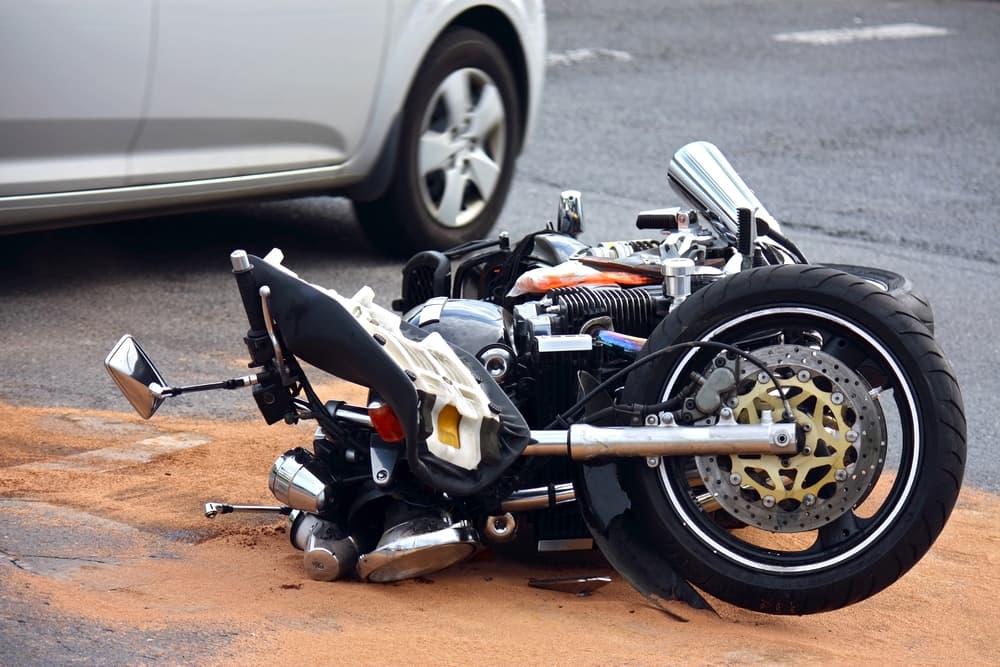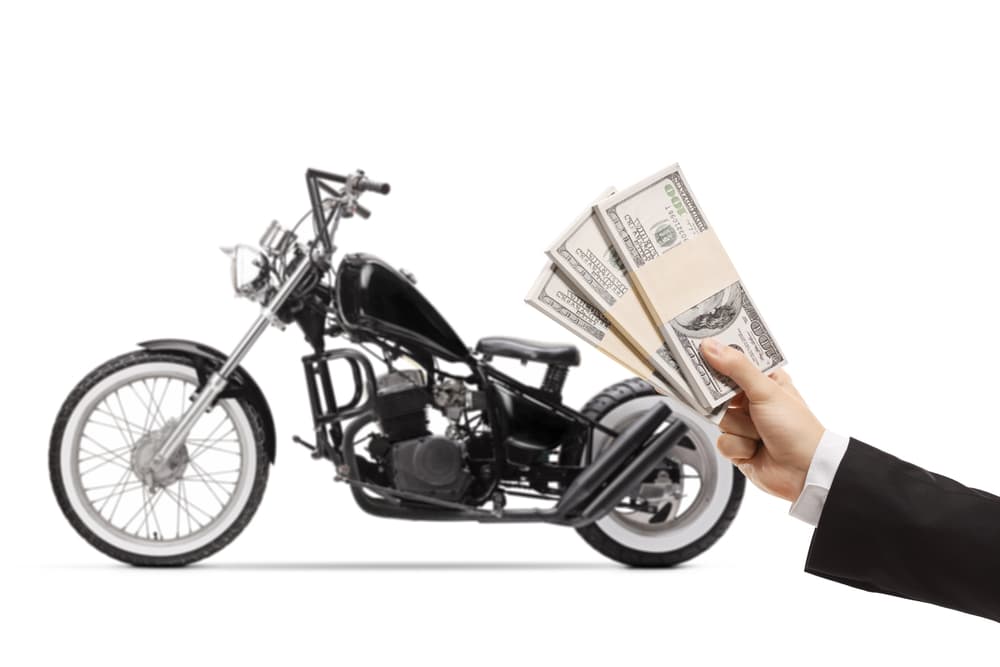If you’ve been in a motorcycle accident and your bike has sustained serious damage, one of the biggest questions on your mind is likely whether the insurance company will decide to total it.
Having your motorcycle deemed a total loss can be upsetting, especially if you have an emotional attachment to it or made special modifications to it. However, in some cases, the damage is so extensive that the insurer determines it’s not worth repairing.
So, what exactly does it mean when an insurance company “totals” a motorcycle? How do they make that determination? And what are your options if you disagree with their assessment?
Here, a motorcycle accident lawyer will tell you about the process of motorcycle insurance claims when a bike is a total loss.
When Does an Insurance Company Total a Motorcycle?

In general, an insurance company will total a motorcycle under the following circumstances:
- The cost to repair the motorcycle exceeds a certain percentage of the bike’s actual cash value (ACV). This percentage varies by state and insurer but is usually around 60 to 80 percent. So, for example, if your motorcycle has an ACV of $5,000 and the repairs cost $4,000, the insurer will likely declare it a total loss.
- The motorcycle is so damaged that it cannot be safely repaired: Even if the cost of repairs is less than the bike’s value, if the frame is bent or there is extensive structural damage, the insurer may still decide to total it.
- The motorcycle is stolen and not recovered: If your insured bike goes missing and the police cannot locate it after a certain period, it will be considered a total loss.
- The motorcycle is submerged in water or sustains flood damage: Water can cause severe damage to a motorcycle’s electrical and mechanical components. If your bike is in a flood, the insurer will likely declare it a total loss even if it appears intact.
When evaluating whether a motorcycle is a total loss, insurance adjusters consider several factors, including the motorcycle’s pre-accident market value or actual cash value (ACV), its salvage value, and the cost of repairs.
Let’s take a closer look at how each of these is determined.
Motorcycle’s Actual Cash Value (ACV)

The actual cash value or ACV of a motorcycle is essentially the pre-accident market value of the bike. It’s what your motorcycle might have sold for on the open market just before the crash. Note that this is different from the replacement cost, which is what it will cost to buy a brand-new, similar motorcycle.
Insurers determine your bike’s ACV by looking at its year, make, model, mileage, overall condition, and any upgrades or modifications. They typically use sources like Kelley Blue Book, NADA Guides, and local comp sales of similar motorcycles to calculate a fair market value.
You must understand that your motorcycle’s ACV is almost always less than what you originally paid, often significantly less if the bike is older.
Motorcycles depreciate quickly, losing around 20 percent when you ride them off the lot. Don’t be surprised if the insurance valuation returns lower than expected, even if your motorcycle was in great condition before the accident.
Salvage Value
Another factor insurers consider when deciding whether to total a motorcycle is its salvage value. This is the amount the insurance company can get for the wrecked bike if they sell it to a salvage yard for parts.
The salvage value subtracts from the total loss settlement the insurer pays you. So, for example, if the ACV of your totaled motorcycle is determined to be $7,000 and the salvage value is $1,000, you will receive $6,000 from the insurance company ($7,000 – $1,000).
Cost of Repairs
Finally, the insurance company will get an estimate of how much it will cost to repair your motorcycle to its pre-accident condition. This includes parts, labor, and all supplemental charges like painting and frame straightening.
The claims adjuster handling your case may have a motorcycle repair shop they work with that evaluates the damage and provides a repair estimate. Alternatively, you can get your independent repair quotes to submit to the insurance company.
If the total cost to repair your motorcycle approaches or exceeds its actual cash value, the insurer will declare it a total loss. Most insurers use a total loss formula that looks something like this:
Cost of Repairs + Salvage Value > Actual Cash Value
Let’s say your motorcycle has an ACV of $8,000. It will cost $6,000 to repair it to its pre-loss condition, and the salvage value is $3,000. In this case, $6,000 + $3,000 = $9,000, greater than the bike’s $8,000 ACV.
The insurer will total your motorcycle since it’s not worth paying them $6,000 to repair a bike that’s only worth $8,000. They’re better off paying you the $8,000 ACV minus your deductible.
Your Options if Your Motorcycle is a Total Loss

If the insurance company declares your motorcycle a total loss, you usually have two options:
- Accept the insurer’s settlement offer and allow them to take possession of the wrecked bike.: The settlement amount will be the actual cash value of your motorcycle minus your deductible amount and the bike’s salvage value.
- Keep the damaged motorcycle and accept a lower payout: If you want to keep your bike, either because you believe you can repair it for less than the insurance estimate or want to salvage it for parts, you can negotiate to keep it. The insurer will deduct the salvage value from your total loss settlement, and you’ll need to repair it properly to make it roadworthy again.
If you decide to keep your motorcycle, you’ll likely need to apply for a salvage title with your state’s Department of Motor Vehicles. Once repaired, it must pass a safety inspection before being registered and ridden. The motorcycle’s title will bear a permanent “salvage” designation, reducing its resale value.
Keep in mind that while you can choose to keep your totaled motorcycle, your insurer doesn’t have to let you – there’s a chance they can insist on taking possession of the bike as part of the claims process. Discuss your options with your claims adjuster.
Negotiating Your Total Loss Settlement
If you disagree with the insurance company’s settlement offer for your totaled motorcycle, you can negotiate for a higher payout. Having solid evidence to back up your counteroffer will put you in a much stronger bargaining position.
Some things you can use to dispute the insurer’s valuation include:
- Receipts and photos showing any custom parts, accessories, or upgrades that increased your motorcycle’s value. Ensure that these factors contribute to the valuation.
- This is proof that you’ve meticulously maintained your bike and that it was in excellent mechanical and cosmetic condition prior to the accident.
- Estimates from local motorcycle dealers show the market value of bikes like yours.
- An independent appraisal from a professional motorcycle appraiser. For a modest fee, you can hire an appraiser to provide a professional opinion on the value of your totaled bike.
When negotiating, always be professional and polite. Getting confrontational won’t help your case.
If the insurance company refuses to budge, you may need to consult a motorcycle accident attorney to explore your legal options. An experienced motorcycle accident lawyer can assess your case and file an appeal if needed to get you fair compensation.
Frequently Asked Questions
Here are some FAQs our motorcycle accident lawyers often answer:
What happens if I have a loan or lease on my totaled motorcycle?
If you have a loan or lease on your motorcycle and it’s declared a total loss, the insurance company will issue a settlement check to your lender to pay off the loan balance. If the insurance payout is more than you owe, you’ll receive the remainder.
However, if you have negative equity and owe more on the bike than it’s worth, you’re still responsible for paying the difference. For example, let’s say you have a loan balance of $9,000, but the ACV of your totaled motorcycle is only $7,000. The insurer will pay your lender $7,000, but you’re still on the hook for the extra $2,000 you owe.
To avoid this situation, you may want to purchase gap insurance when you buy your motorcycle, especially if you finance it over the long term. Gap insurance covers the “gap” between what you owe and what the bike is worth in the event of a total loss.
Can I remove custom parts and accessories before the insurer takes my totaled motorcycle?
If you have custom parts on your motorcycle, like expensive saddlebags, a sissy bar, or chrome accessories, you may want to remove them before releasing your bike to the insurance company.
Discuss this with your claims adjuster. Some insurers will let you strip salvageable parts, while others prohibit it. If you are allowed to remove parts, document their removal and adjust the bike’s value accordingly.
Will my motorcycle insurance premium go up if my bike is totaled?
It depends on the circumstances of your accident and who was at fault. If you caused the accident that totaled your motorcycle, your insurance premium will likely increase since you’re now considered a higher risk. However, your rates may not be affected if someone else caused the accident and you filed a third-party claim with their liability insurer.
My totaled motorcycle was a classic or custom build. How do I ensure the value is assessed accurately?
Classic, antique, and custom motorcycles are often challenging to value after an accident since they may have one-of-a-kind parts, sentimental value, and rarity that’s hard to quantify.
If your totaled bike is a vintage treasure or a unique custom build, consider the following:
- Make sure you have the motorcycle insured with a “stated value” or “agreed value” policy where you and the insurer agree on a specific value for the bike when the policy begins. This type of coverage is helpful if you have a motorcycle whose value exceeds the standard market value for that make and model.
- Keep all receipts for custom parts, accessories, and original pieces you use during restoration to help prove the motorcycle’s value to insurers.
- Prior to an accident, have the motorcycle appraised and photographed, especially if it’s a rare classic or has an interesting history. This establishes a record of its condition and can be used to support your case for a higher valuation.
- Work with an attorney who focuses on motorcycle accidents and knows classic bikes and their value. A motorcycle accident attorney can negotiate with the insurer for a fair settlement.
How long does it take to settle a totaled motorcycle claim?
The timeline for settling a totaled motorcycle claim varies case by case but typically ranges from a couple of days to a few weeks. Factors that can draw out the process include disputes over the motorcycle’s value and the case being part of a more complex multiple-vehicle accident.
Expect it to take at least several days for your claims adjuster to evaluate your bike’s damage, request maintenance records, and calculate its ACV. During this time, remain patient and cooperative with the process to ensure a thorough assessment of your claim and facilitate a fair settlement.
Contact a Motorcycle Accident Attorney
Dealing with a totaled motorcycle is stressful, but knowing what to expect and being proactive can make the process smoother.
Remember, insurance companies will initially try to pay as little as possible. Don’t settle for less than you deserve. With the proper documentation and a willingness to negotiate, you can reach a fair settlement for your totaled motorcycle.
If you believe the insurer isn’t offering enough for your bike or your injuries, don’t hesitate to consult with a personal injury law firm in Atlanta. The right motorcycle accident lawyer can review your case and fight to get you the maximum compensation under the law.
Initial consultations are free, so you have nothing to lose by seeking professional legal guidance to protect your rights as a motorcyclist and potentially secure the compensation you deserve.